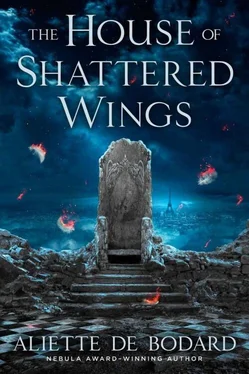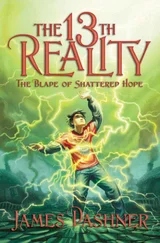Philippe shook his head. “That’s not important. Listen, Selene—”
“Not important?” Her hand moved, encompassed the wreck around her. “ This is what we are now, what we are reduced to. All your fault.”
His gaze was steady. “I meant no harm.”
“You did it regardless.”
“Oh, for Heaven’s sake,” Philippe said. “We can argue about responsibility later, Selene. Listen.” His words came fast now, one after another with hardly a breath, his voice expressionless. “Isabelle is dead. The banyan is a tree of rebirth — it took the magic of the House and used it—”
“Isabelle?” Selene asked, her heart sinking, just as Emmanuelle asked, “Rebirth?”
“Yes. You have to—”
But in that moment, the cathedral exploded.
A huge noise deafened Selene; she dived, reflexively, even as bits and pieces of the tree were sent into the air. She barely had time to see Emmanuelle put up wards around herself; she reached out, raised her own in a wider circle, hoping there wouldn’t be too many people in their path; and then the world was a welter of dust and flying things, and she couldn’t see anything, anymore.
She rose, slowly; reached for the mirror at her belt, inhaling the stored breath until magic coursed through her veins again. Then she turned toward the cathedral.
Notre-Dame’s doors were gaping holes, surrounded by dying roots. And in their center…
Selene recognized her immediately, though it had been many decades. She had barely changed, in the sense that her physical features were the same: that same harsh cast to her face, those same huge, driven eyes that gave the impression of seeing straight into your soul. But other things had changed: her skin now held trapped light, as though she were a Fallen; and she moved with fluid, inhuman grace as she walked to the edge of the parvis, surveying the devastation she had wrought.
Her gaze met Selene’s, and she smiled. “Hello, Selene.”
Selene walked, slowly, toward her, the world reduced to nothing but the hammering of her heart, like a hummingbird’s wings straining against a cage of ribs. “Hello, Nightingale.”
TWENTY-FOUR.HEAD OF THE HOUSE
THEhuge explosion had deafened Madeleine, but it had turned out to be nothing more than the doors blasting open. Dust had risen thick around her, a cloud that racked her lungs. Now it was subsiding, leaving her barely enough light to guess at the shape of Isabelle’s corpse.
Isabelle.
She had gotten Madeleine out of Hawthorn; even if it was only for a moment, even if it was only a loan. She had known about the angel essence; about the addiction; and had still come back. Had still believed in Madeleine’s skills as an alchemist; in her as a teacher and as a mentor, and as a friend.
And in return, what had Madeleine done for her?
Nothing.
If only she’d had more time…
But it was a lie. One made do with the time one had; and this — from the beginnings in Hôtel-Dieu to this unbearably warm jungle — was all they had been given.
She had failed Oris. She had failed Isabelle. And — she had failed Silverspires, too, in the end; had given the House nothing but her slow dying.
Morningstar might not have saved her, but Silverspires had been her refuge and her sickbed for all of twenty years.
Light streamed from the hole Nightingale had opened in the tree’s roots, too bright for her to guess at more than silhouettes. Light, like the bright and terrible and unforgiving light from the City — she knew what it was now, what Fallen carried in their hearts, the unbearable knowledge that there was no absolution that would wash away the taint of what they had done; nothing that would reopen the pathways to Heaven and let them immerse themselves in the glory of God.
She closed Isabelle’s eyes, mouthing a prayer that the Fallen would find her way home, and rose. Her eyes were dry; her lungs and whole being wrung out, as if she had run for an entire night. She might as well return to Hawthorn: there was nothing left for her here, nothing in the whole world that held meaning for her.
No. That wasn’t quite true.
She reached out, and found, by touch more than by eye, the mirror that Emmanuelle had handed to Isabelle. It burned her hand as she touched it, the trapped malice within it almost palpable. If that was only a fraction of what Philippe had unleashed…
“Destroy it,” Emmanuelle had said, “in the hollow of the tree.”
She didn’t know if it would make a difference, but she had to try.
* * *
ONthe steps of the cathedral, Selene faced Nightingale. “It’s been a long time,” Nightingale said, with a wide, insincere smile.
“Indeed.” Selene kept her voice low. “And what will you do now, Nightingale?”
“Do?” Nightingale raised an eyebrow. “I have nothing left to do, have I? I’ve won. Your House lies in tatters.”
“No, not quite,” Selene said.
Nightingale’s gaze raked the market square; the mass of people that looked like a refugee camp. “You’re right,” she said. “But it won’t matter, will it? You’ll be easy pickings, Selene. I could destroy you all; but it will be more satisfying to see others do it for me. Then everything Morningstar fought for will be gone.”
“Did you hate him so much?” Selene asked; and Nightingale’s face darkened.
“You’re not the one he betrayed,” she said.
“I know.” Selene thought of Morningstar; now lying dead and cold somewhere in the bowels of Silverspires. “But he did it for the good of the House.”
“And that excuses anything?” Nightingale turned. Light streamed out of her, making her a living beacon against the churning of the darkened skies. “Shall I tell you what they did to me in Hawthorn, Selene? Every cut of the knife, every broken bone, every wound that wouldn’t close…”
“No more than what Morningstar did,” Selene said. The cells had gone dusty in her time; because she wasn’t Morningstar. Because she wasn’t hard enough, and look where it had got them. “I grieve for what happened to you, Nightingale, but it doesn’t give you the right to destroy us.”
“Of course it does. The House is based on lies, Selene, on selling its own dependents to further its own interests. Do you truly believe you deserve to survive?”
Justice. Blood. Revenge. Had she been so naive, once? “All the Houses are the same.”
“Then perhaps no House deserves to survive.” It was Philippe’s argument; and Philippe’s face, closed and arrogant; and the same desire she’d felt then, to smash his high-mindedness into wounding shards.
“And that would be your mission?”
Nightingale’s face was serene. “Who knows? I don’t owe you anything, Selene. Least of all accounts.”
“No,” Selene said. “But I owe you something, Nightingale. Excuses.”
“You made them. I have accepted them, but they change nothing. You’re not Morningstar; of course you’re not. No one can be, Selene. No one can loom as large as he did; no one can hold an entire room to attention by merely stepping into it.” Her face was soft then; some of the intensity smoothed away, as if she recalled happier times — as if they had ever existed. Morningstar hadn’t been a kind master. “And you certainly couldn’t hold the House he built together.”
Selene bristled. “I am head of the House.” Within her, almost nothing; the magic sunken down into cold ashes, the protections almost stripped away. The House was dead, or dying; and she had presided over its demise; had failed to see the danger until it was too late.
“Oh, don’t blame yourself.” Nightingale shrugged. “He took us all, didn’t he? Saw something in us and tried to remake us into more than we were. Some of us broke; and all of us failed. All disappointments.”
Читать дальше

![Никки Сикс - Героиновые дневники. Год из жизни павшей рок-звезды[The Heroin Diaries - A Year in the Life of a Shattered Rock Star]](/books/78612/nikki-siks-geroinovye-dnevniki-god-iz-zhizni-pavshej-rok-zvezdy-the-heroin-diaries-a-yea-thumb.webp)










